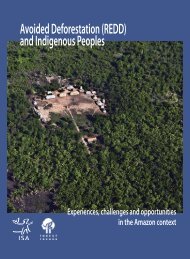BASELINE STUDY 5, Thailand - Forest Trends
BASELINE STUDY 5, Thailand - Forest Trends
BASELINE STUDY 5, Thailand - Forest Trends
Create successful ePaper yourself
Turn your PDF publications into a flip-book with our unique Google optimized e-Paper software.
ply due to high rubber prices which causes farmers to delay replanting. Thus, high rubber prices can have serious<br />
consequences for rubberwood supply to <strong>Thailand</strong>’s sawmilling and panel industries.<br />
Along with Thai Bank for Agricultural and Agricultural Cooperatives (BAAC), the Office of Rubber Replanting Aid<br />
Fund (ORRAF) subsidizes the cost of rubber plantings, which is viewed as necessary to keep farmers from<br />
switching crops as has been the problem for other programs. 18<br />
5.2.4 Area and Standing Volumes of Eucalyptus and Other Pulpwood Plantations<br />
<strong>Thailand</strong>’s pulp and paper industry, a dominant aspect of the country’s wood sector, relies exclusively on industrial<br />
tree plantation wood. There are two major company groups involved in eucalypt plantations production in<br />
<strong>Thailand</strong>: the Kaset Rungruent Perchopol Group (linked to Advance Agro Company), and the Siam Cement<br />
Group (Boulay 2009:58).<br />
Estimates of the area of eucalyptus plantations range between 480,000 to 600,000 hectares. 19 Smallholder<br />
farmers account for between 80-90% of this total pulpwood production zone (RISI 2008). Higher farmgate and<br />
factory gate prices for logs by Thai pulp and paper firms since 2006 have made eucalyptus planting a more attractive<br />
prospect for smallholders and contract farmers. Contract farming has become an important arrangement<br />
for smallholders for eucalyptus. The major Thai pulp firms are estimated to have more than 200,000 hectares<br />
under this type of contract according to the following breakdown: Advance Agro, 80,000 hectares; Phoenix<br />
Pulp and Paper, 108,000 hectares; and Siam <strong>Forest</strong>ry, 44,800 hectares.<br />
There is no evidence of natural forest wood entering into the Thai woodchip or pulp manufacturing supply<br />
chains (Barney 2005) and there does not appear to be any current major conflicts with plantations replacing<br />
natural forests in <strong>Thailand</strong>, as occurred in the mid- to late-1980s. To date, the Thai pulp companies or woodchip<br />
exporters have not directly invested in plantation concession projects in neighbouring countries (Laos, Cambodia<br />
and Myanmar) that could directly link these firms to illegal natural forest logging. However both Advance<br />
Agro and Phoenix Pulp — now owned by Siam Cement Group (SCG) — do have collection units for purchasing<br />
pulpwood logs in Laos.<br />
5.2.5 Area and Standing Volumes of Teak<br />
Since 1993 teak plantations have been increasing in <strong>Thailand</strong>, largely due to state subsidies to private planters.<br />
The Re-Afforestation Act of 1992 introduces some obstacles to private sector investment however; and once<br />
amended private sector planting is expected to increase (FAO 2009:47). 20<br />
The FIO remains the most important state agency involved in teak plantation establishment. Up to 2000,<br />
836,000 hectares of teak plantations was reportedly established by both private and public sectors (FAO 2001<br />
cited in FAO 2009:46). 21 The FIO maintains a teak plantation base of some 80,000 hectares. The long-term yield<br />
18<br />
According to FAO, ORRAF has started to even include non-rubber crops for the subsidy, such as teak and dipterocarp<br />
species.<br />
19<br />
Barney (2005) found a consensus for the area of eucalypt plantations of approximately 480,000 hectares. A 2007 estimate<br />
by a major Thai firm estimated a pulpwood production area of 600,000 hectares, including 50,000 hectares of new<br />
plantings in 2007.<br />
20<br />
Mahannop (2002) cited a number of disabling policies. The Re-Afforestation Act and associated regulations was noted<br />
as difficult to implement and did not cover all tree species. Second, there were restrictions on the establishment of woodbased<br />
industries in the outer provinces (as opposed to the 10 central provinces where these restrictions do not exist). Lastly,<br />
the renting of Reserve <strong>Forest</strong> was noted as onerous and restricted to 50 rai per investor; and some species remain on a<br />
restricted export list.<br />
21<br />
This figure of 836,000 hectares of teak is open to dispute, given the poor state of Thai forest and plantation inventories.<br />
© EU FLEGT Facility, <strong>BASELINE</strong> <strong>STUDY</strong> 5, <strong>Thailand</strong>: Overview of <strong>Forest</strong> Law Enforcement, Governance and Trade, July 2011<br />
This Action is funded by the European Union and the governments of Finland, France, Germany, the Netherlands, Spain and the UK. The views expressed herein<br />
can in no way be taken to reflect the official opinion of the European Union.<br />
www.euflegt.efi.int<br />
38
















